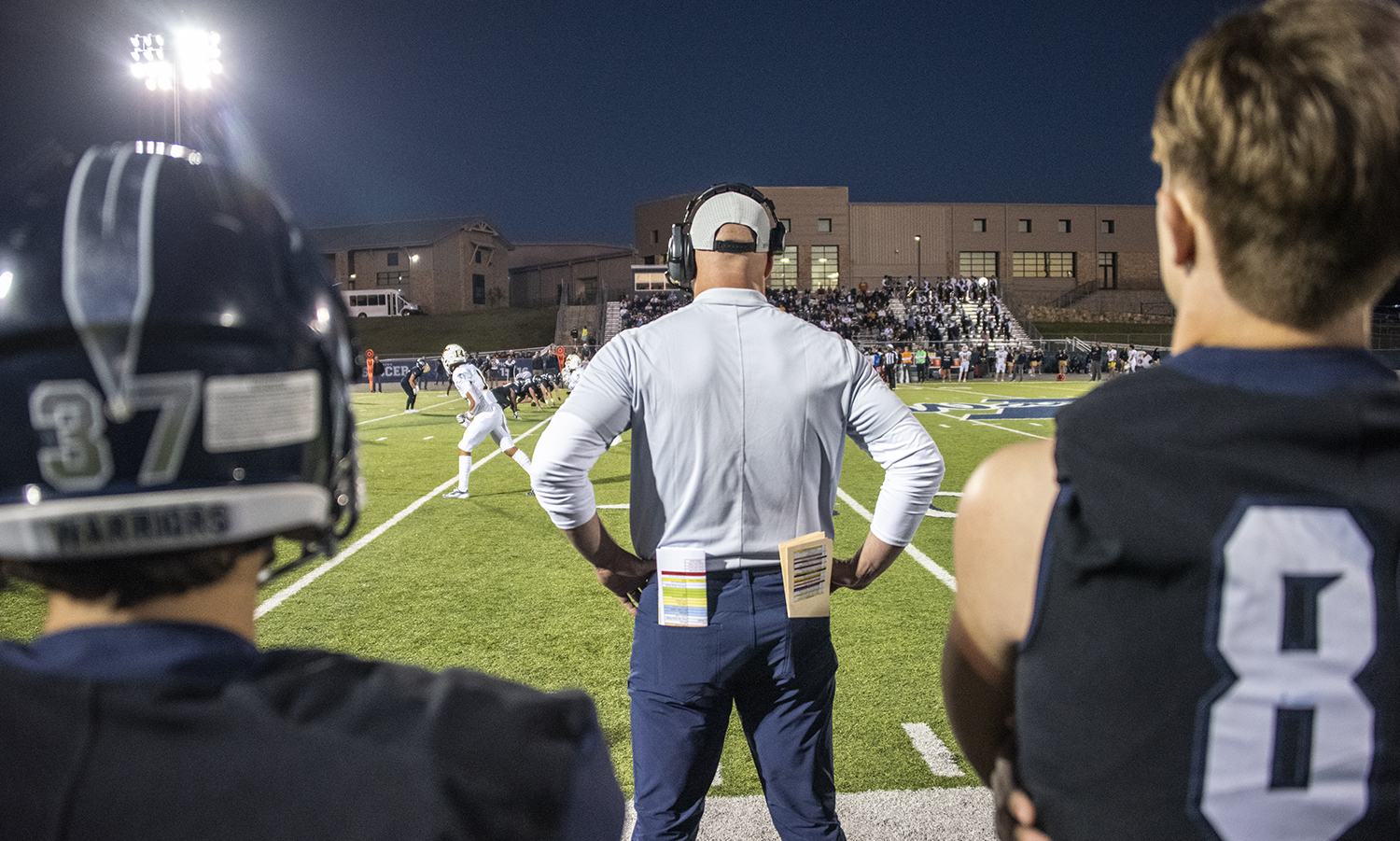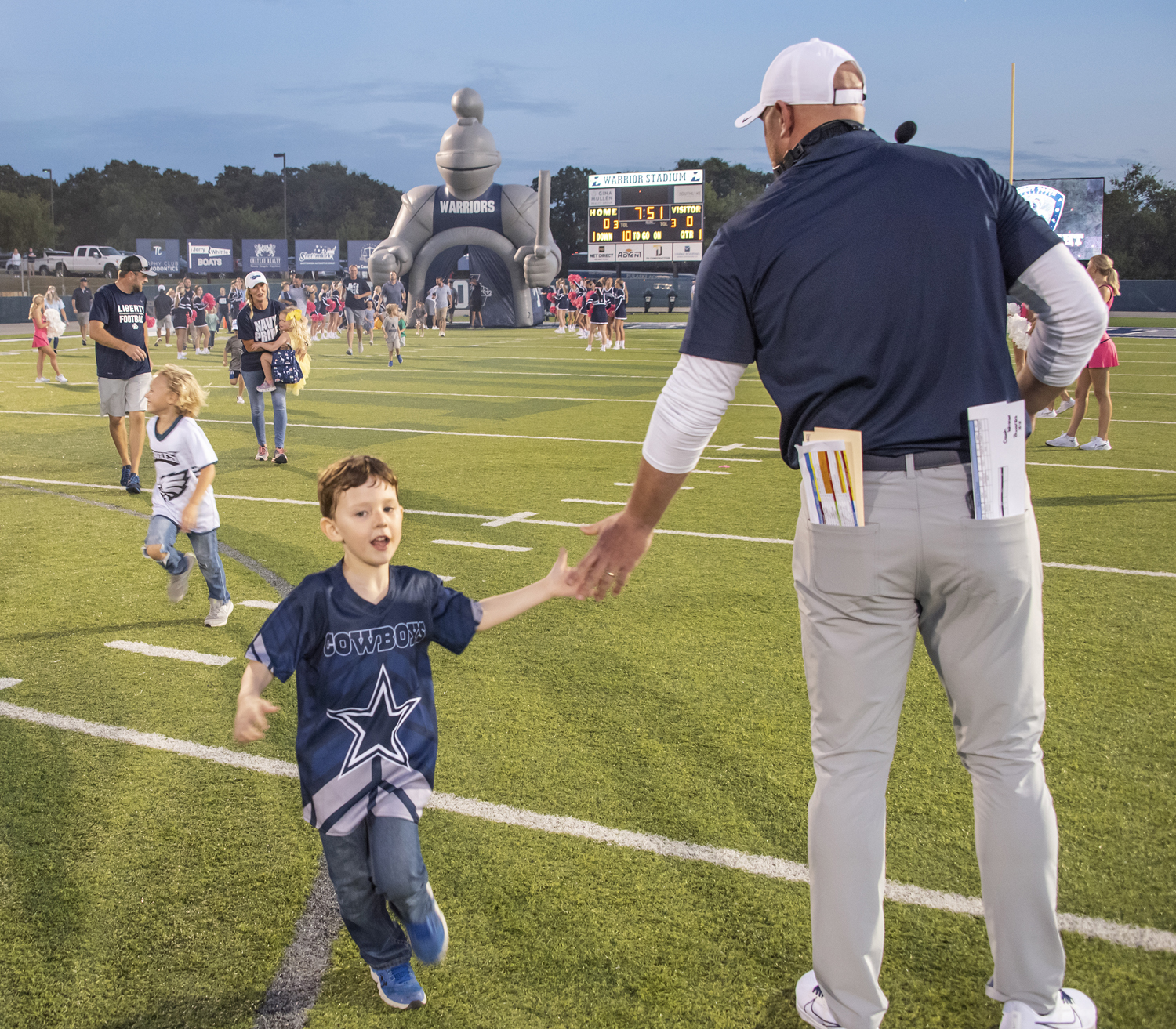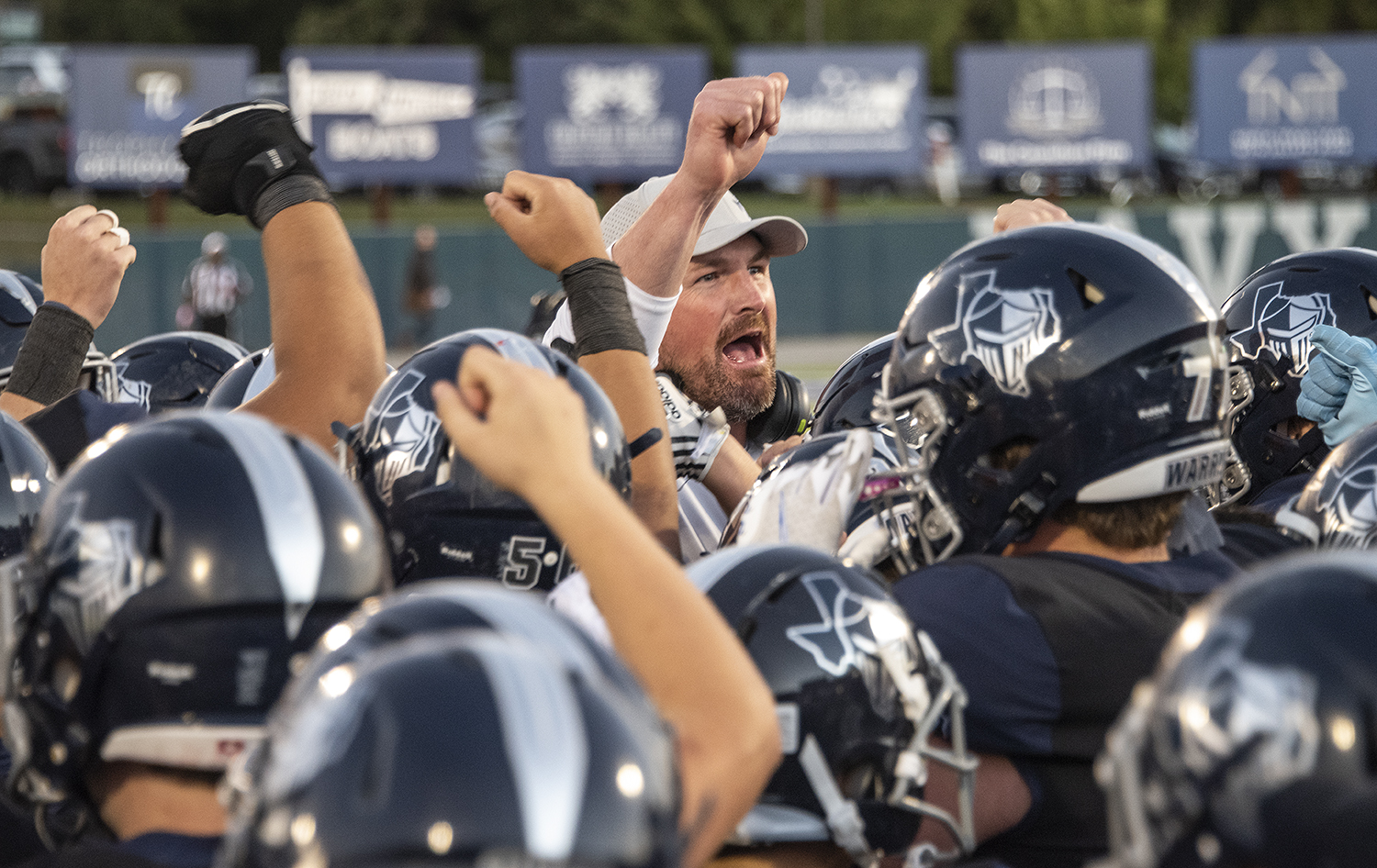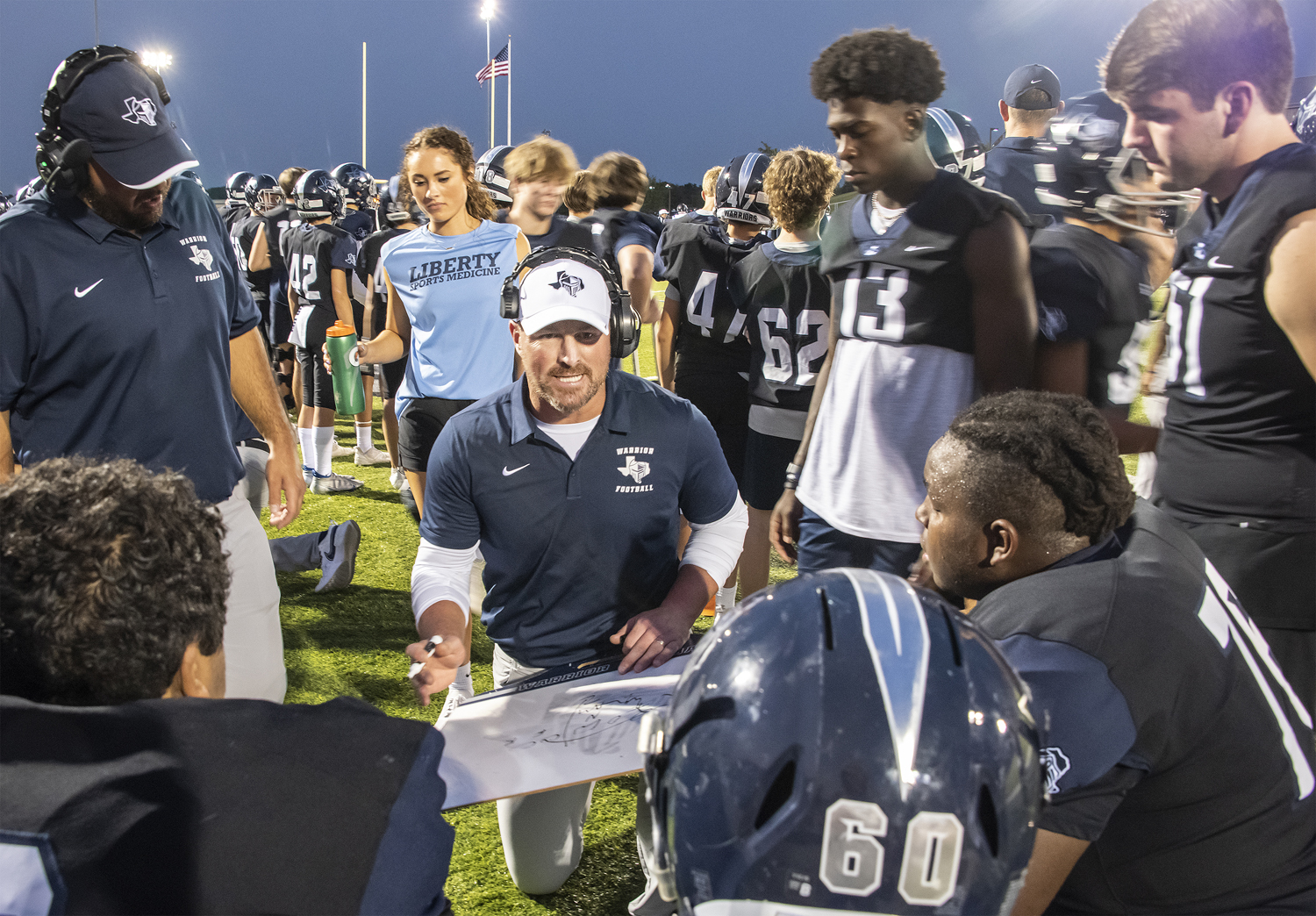Jason Witten began his first season coaching high school football with a win. Last week, he concluded with one, too. In the fairy tale, this would be a year filled with triumphs, the most decorated Dallas Cowboy of the millennium riding into Argyle, Texas, where he takes Liberty Christian, with a high school enrollment of 372, to a state championship. It didn’t happen that way.
The Warriors finished 2-8; the season prior, they’d gone 2-7. It’s an inauspicious beginning to his second retirement from the NFL. After the first one, he spent one season in the booth doing color on Monday Night Football. That also didn’t go well.
Whether on national television or on the sidelines at a small private school’s field, he draws attention. There is a curiosity about Witten doing this, of all things, at Liberty, of all places. Back in August, an intrasquad scrimmage on a hot day filled the stands halfway. A throng of media was in attendance. Athletic director Johnny Isom says it was nothing compared to the day they announced Witten’s hiring.
“Bananas,” he says. “We knew it would be a big deal. But you’re never sure how big a deal.”
At Witten’s one scheduled media availability of the season, Isom introduced him by comparing his arrival to some of the school’s great milestones over the last 20 years, from moving out of Denton and settling in Argyle in 2005 to the construction of its two-story high school to the expansion of its athletic department. A standing-room crowd hung on each word.
“We don’t have press conferences like that—and definitely don’t fill rooms like that,” Isom says.
That’s not how Witten would prefer it. The attention is like an uncomfortable suit that he’s forced to wear and sheds as quickly as he can. For this story, I got exactly five minutes with him after a game. Were it up to him, he’d be just another coach in a navy blue polo, khakis, and a ball cap.
He can’t be, of course, probably not anywhere but especially not here. Immediately, Jason Witten became synonymous with Liberty Christian in a way few Texas high school football coaches ever have been with a program before their even first season kicked off. Former Cowboys quarterback Jon Kitna coaches in Burleson, while longtime Philadelphia Eagles backup Koy Detmer does so in the Rio Grande Valley. Deion Sanders broke into the scene as head coach of Prime Prep Academy, the ill-fated charter school he founded. But, at least in recent memory, there is no corollary to Witten in the state: a bona fide NFL legend beginning his coaching career as a high school head coach somewhere other than a school he created.
So why this and why here? Witten may not say much to the media, but those around him have the answer.
✰✰✰
Jason Witten’s current job probably makes more sense to him than his NFL career ever did. Years prior to his becoming a professional football player—much less one of the greatest tight ends in history—his plan was to do exactly what he is doing now. “I think if you would have told us this was our life, we would have laughed,” his wife, Michelle, said in a 2016 interview. “We were going to be content [with] me being a nurse and him coaching high school football. That’s kind of what we envisioned.”
“We knew it would be a big deal. But you’re never sure how big a deal.
Johnny Isom
Time has a way of altering dreams, updating and rewriting them the longer one gets between inception and actualization. For Witten, that spanned two decades, which perhaps begins to explain why he tried his hand at color commentary in 2018. The marriage made sense. ESPN needed their answer to Tony Romo following his startlingly successful rookie year at CBS. Why not extend the Cowboys’ run of celebrated broadcasters by tapping the quarterback’s running mate, who enjoyed a higher approval rating in Dallas than Romo ever had during his playing days? Those around Witten presumed he’d play until someone scraped him off AT&T Stadium’s field, but he was about to turn 36 and had a young family at home. Maybe he wasn’t ready to retire, as he said upon his return to the Cowboys a year later, but what better, more prestigious job could he walk into than football’s most storied broadcast booth?
“I think that was just more about opportunity that presented itself right there at that moment,” says Shawn Witten, Jason’s older brother by two years.
It didn’t suit him. Tune in to Romo’s broadcast, and it’s impossible not to focus on the announcing booth’s microphone—the way it invigorates him, amplifies him. Witten, by contrast, made you more aware of the booth’s narrow walls, how easily they could make the wrong fit come off as boxed-in, confined. He flubbed words. Looked stiff under a headset. The effect was the opposite of his defining moment as a Cowboy: bounding down the field without a helmet, wild and free, in a 2007 win over the Eagles. So when he retired for the second time, in January, it wasn’t to have another go at television. Instead, his brother says, “I think we all knew that eventually coaching would be a part of his tree and part of his legacy and something he would fall back on.”
Witten claims he had offers at both the pro and college levels, and no one really doubts it. He has seen much and traveled well, and if 17 NFL seasons aren’t résumé enough, his play is—less the accolades themselves so much as how he achieved them, through sweat and savvy, exhausting every available avenue to make a good athlete great. “The ability to kind of find all the little secrets to allow me to be successful was kind of my winning edge,” he says. That translates no matter where he works.

But it feels appropriate that he’d find his way back to high school. Witten’s uncle is a high school coach. So are his two older brothers. And, most significant, so was his grandfather. Dave Rider was a legend in Northern Tennessee, a high school coach for nearly 40 years, 24 of them at Witten’s alma mater, Elizabethton High School. To his grandsons, he was far more than that. Rider took in the boys and their mother, Kim, after she fled an abusive marriage to Witten’s father. It was Rider who brought them to church and taught them to be tough. To treat women the way he did their grandmother, Deanna, to whom he was married for 63 years, until his death last winter.
When Witten was a freshman at the University of Tennessee, Volunteers head coach Phillip Fulmer asked him to move from defense to tight end. He wanted no part of it. “I thought he was crazy,” Witten told The Athletic of Fulmer, then just two years removed from a national championship and at the peak of his powers. Then he got on the phone with his grandfather. Stop pouting, Rider told him. Just like that, Witten did—and a Hall of Fame career was born.
“[Rider] was just our male role model,” says Shawn, the head coach at Elizabethton since 2007. “He was our inspiration. He was our motivation. He allowed us to dream.”
Rider would coach all three of his grandsons at Elizabethton and win big with them, too, reaching three consecutive state semifinal games in the ’90s behind Shawn and Jason, before retiring in 1999 with 173 victories and 10 conference titles. At that Liberty press conference, Witten mentioned none of that when a reporter asked him about his grandfather. Instead, he talked about December 28, 2020—Rider’s memorial service. It was held in Elizabethton’s gymnasium. Witten said that what sticks with him are the stories, how many husbands and fathers stopped by with something to say about the men they became after playing for Dave Rider.
“There were guys who played for him 40 years ago talking about the impact he had on their life,” he says. “That was a big part of making this decision.”
Witten began his eulogy that day by introducing himself, for the benefit of “those of you I haven’t met,” as “Coach Rider’s grandson, Jason.” It was textbook Witten: self-effacing without intending to be. It’s hard to imagine anyone in the Volunteer State not knowing who Jason Witten is, but the context is about him as much as them. He is still Dave Rider’s grandson—always will be. His new job is the ultimate opportunity to live up to the standard that Rider set.
✰✰✰
Liberty Christian School sits on 93 acres of hilly land, making it the rare school in Texas with more parking than it could hope to fill on game day. Tuition runs a hair under $20,000 annually for what the school terms a “holistic, college preparatory education in a nurturing, Christ centered environment.” The usual amenities are there: classrooms, science labs, playing fields, tennis courts. So is a broadcast media studio, a spiritual life lounge, and an indoor playground for elementary schoolers. On Friday nights, the Warriors play on a field sponsored by a real estate agent, while fans clamor for swag shot out of a t-shirt cannon sponsored by an orthodontics company. Players sprint onto the field through a colossal inflatable gray medieval knight. A pregame prayer is broadcast over the P.A. system before kickoff. Six flags line the top fence of the home stands: four Texan, two American.

The school’s blend of academic prowess and Christian values has attracted its share of high-profile parents. David Murphy, the former Rangers outfielder, is a Liberty parent, as is Brad Hawpe, an All-Star for the Colorado Rockies in 2009. So, too, is Donald Driver, the four-time Pro Bowl receiver for the Green Bay Packers, whose son, Christian, is Witten’s best player and has verbally committed to Penn State.
Witten is a Liberty parent, as well, and had been for eight years prior to becoming the school’s football coach. All four of his and Michelle’s children are enrolled at the school; their eldest, 14-year-old C.J., is a freshman linebacker on his team. According to Liberty’s president, Dr. Blair McCullough, the Wittens are a fixture on campus, regularly attending school events, sometimes volunteering to work them. Time was tight during Witten’s playing days, but, Isom says, it wasn’t unheard of to see him pop in to the occasional practice and help out with a drill. When the athletic director asked Witten to speak to the school’s baseball team, he jumped at the chance, conveying the importance of character as well as hard work. None of it felt forced. “I think one thing that they’re able to do here is be normal,” Isom says.
So it isn’t surprising to hear Witten say, “This was home.” It did, however, catch the school off guard to learn he was interested in its vacant head coaching position, which became available when former head coach Steven Greek resigned in January. He left behind a young roster and a program that last won a state championship in 2007. But Witten wasn’t deterred. Coaching at Liberty would allow him to take on a new challenge while spending more time around his family than ever before—a priority after living away from them during his final NFL season, with the Las Vegas Raiders.
It would also pair him with an administration who sees the job the way he does. Isom insists that winning “is not the main thing for us,” and if the school’s stated values aren’t proof enough, sheer pragmatism is: barring a major surge in enrollment, Liberty doesn’t have the bodies to become a football superpower. Witten says he’s after something deeper than that, anyhow. High school—and Liberty—are where he can matter to people the way Rider mattered. He wants to win, badly, “but if it stops there, then we’ve missed the boat—I’ve missed the boat,” he says. He believes in the power of the sport he chose; football, he says, taught him about adversity, determination, and perseverance. High school is how he can pay those lessons forward to a new generation. “He’s into developing the complete kid,” Isom says.
Which is a lot of work. However much Witten insists “coaching’s coaching,” the truth is it’s not. Each level comes with its own trappings, and in high school, Shawn says, “your program is a reflection of you.” It’s one of many topics they’ve discussed along with their eldest brother, Ryan, an assistant at Elizabethton. Throughout Witten’s playing career, he served as a resource for them, eager to siphon the knowledge he accrued at the game’s highest level back down to the high school ranks. Now the roles are reversed. Shawn says he and Ryan talk to Jason more now than they did many years when he was playing. They chat in bursts—“a lot of two-minute, five-minute, 15-minute conversations,” Shawn says—about the challenges Jason is now facing, ones they’ve weathered for years at Elizabethton, where they’ve built on Rider’s legacy by winning state titles in each of the past two seasons.
Witten may be home for dinner each night, but he also faces headaches he wouldn’t encounter higher up the ladder, where bureaucracy and expectations go hand in hand with resources and a streamlined job description. Coaching high school is about keeping tabs on grades and monitoring class attendance, about managing assistants with variable schedules while wearing an extra hat: assistant director of sports performance, which encompasses his offseason role helping run Liberty’s strength and conditioning program. It means cultivating a youth program and popping in at the middle school from time to time, too, to get acquainted with who will be joining the team in the near future. It’s limited practice windows during the school week and pared-down schemes on Friday night because coaching high school is sometimes more about damage mitigation, less tactical knowhow than making sure everyone is lined up in the right place.
“If you’re going to put your name on something, you want to be all in. You can’t ask that from your kids if you’re not modeling that.
Jason Witten
Witten considers that a worthwhile trade-off in exchange for a chance to make an impact. He also knows he can only do so if players understand just how much he cares about them, that this isn’t “one of those deals where I’m not going to show up to a three-hour practice [and say], ‘Text or call me if you need anything.’” Just like in his playing days, the best way he can show them is by example. He’s hung a sign outside the locker room that reads “The secret’s in the dirt”—Wittenese for “hard work pays off”—and no task is too small to prove his point. He’s lugged pads to the field, done team laundry, and filled water bottles. He recently got his first taste of middle-school lunch room duty, where he wiped down tables and curtailed mischief. He devours film just like in his playing days, but he carves out time for small talk in the athletic office, as well.
Nevertheless, he’s careful not to blur the lines between coach and players. “I’m not Coach Bro; that’s not what I am,” he says. Rider was a disciplinarian, and so, too, was Bill Parcells, who drafted Witten and shaped his early years in the NFL. “The coaches I respect and I call to this day for advice were the ones who pushed me and challenged me and made me uncomfortable,” he says. He is unafraid to crack down on players who miss practice or fail to wear Liberty gear during workouts. Rule-breakers are liable to pay with their job security. On Fridays, says senior running back and linebacker Colby McCray, “he’s going to put maybe not the most talented 11 people on the field but … the people that show up and work and do their job.”
Senior receiver-defensive back Elijah Williams says he felt the environment change. “The biggest thing from the last two years was we weren’t really a team,” he says. “We just had a whole bunch of guys that wanted to play for themselves. Since he’s gotten here, the main thing has been team.”
He preaches process: how the kids work, how they cope with adversity, how they progress. As long as they do it together, Witten figures, the rest will sort itself out.
✰✰✰
Liberty has another motivation for hiring Witten—on face value, perhaps the most far-fetched of all. Longevity. “You’re looking for someone that you feel like you’re not doing this two years from now,” Isom says. “I just felt like, bringing him in, we’re gonna not have to hire another football coach for a while.”
It’s a bold claim about someone who, between his contacts and his cachet, will always have flashier prospects. Witten’s kids won’t be young forever; as they grow older, will coaching at Liberty hold the same sway over someone who competed and thrived at football’s pinnacle? Shawn believes that, sooner or later, his brother will look to test himself at a higher level of coaching. “I think, eventually, he’ll gravitate towards maybe college or the pros because it’s an opportunity of a lifetime to coach on the biggest stage,” he says. But who knows? Shawn remembers a time, seemingly not so long ago, when he swore to himself he’d be at Elizabethton for four years, then move on. He’s in his 15th season. Why couldn’t that be Jason, too? Perhaps, Shawn says, “he may fall in love where he’s at.”
To fully turn the Warriors around, he might need to. Witten is well-versed in his brother’s journey at Elizabethton; it took Shawn a decade to build the program he wanted. Witten’s first season at Liberty was a sobering reminder of how far his own program has to go. According to Greg Tepper, managing editor of Dave Campbell’s Texas Football, a brutal schedule has plenty to do with it. Six of Liberty’s losses were to teams ranked inside the top 10 of MaxPreps’ Texas Association of Private and Parochial Schools (TAPPS) rankings, including each of the top three. A seventh was a nonconference game against Little Rock’s Pulaski Academy, among the best teams in Arkansas. “In many respects, [it’s] like the SEC of private school football,” he says of Liberty’s division. “Every single week, you are playing another juggernaut.”
The Warriors had their moments, from cracking the 50-point mark in wins to bookend the season to a near-miss, one-point loss against seventh-ranked Dallas Christian. But they only provide so much consolation for the 45-14 beating top-ranked Parish Episcopal administered in September. Or a four-game stretch to open October in which the Warriors were outscored 173-42. The distance between Liberty and their opponents was generally less a gap than a chasm, the kind that can take years to shrink. Is Witten up to seeing that through?

But perhaps there’s a better barometer for success. During Dave Rider’s memorial service, Witten’s eldest brother, Ryan, shared an anecdote about his first day in coaching. He’d gotten thrown in the fire and held his own. He couldn’t wait to tell Rider all about it—but when he did, his grandfather dwelled more on three Styrofoam cups Ryan had left lying on the field. “You forgot the most important part,” Rider chided him. “Always leave it better than you found it.”
Through that lens, nights like the Warriors’ loss to Prestonwood Christian Academy in mid-October show Witten is well on his way. It’s Liberty’s homecoming game, and the blazing temperatures of August scrimmage have given way to an early fall chill. The cheerleaders are bundled up in sweats. The Texas flags whip in the breeze. Prestonwood jumps to a 14-0 first-quarter lead, which becomes 17-0 at the half. By the fourth quarter, it’s 24-0. The game is well in hand as the Warriors inch up the field in the waning minutes, moving into scoring position thanks to a pair of penalties on PCA’s defense. Witten soon finds himself with a decision to make. It’s 4th-and-goal from the 11 yard line—tough sledding for any team, much less one that hasn’t scored all night. The field goal is a chip shot; take the points, and his team avoids a homecoming shutout, the worst sort of indignity for teenage football players.
He goes for it. Quarterback Steel Doss sails a pass over Driver’s head, but the receiver draws a pass-interference call to earn Liberty a fresh set of downs. One play later, Doss scrambles into the end zone. 24-6. The crowd erupts in cheers. Rainbow confetti fills the air. Witten goes for the two-point conversion for good measure, which fails, not that anyone minds. The Warriors can go home with something to smile about.
To Witten, the outcome is almost immaterial. “I don’t believe in moral victories,” he says after the game. The message behind his decision is bigger than six points in a blowout loss ever could be. It’s one more way he can lead by example—to show his players that his words mean something. “I can’t sit there as a coach and say, ‘I believe in you,’ if we’re not going to go for the touchdown,” he adds. With any luck, the Warriors will face drives with far greater stakes sooner than later, and when they do, they will have this moment to fall back on for confidence: that time their coach told them they could do something, against reasonable odds, and trusted them to prove him right. If Witten is luckier still, some of them might carry it much further, well beyond their final down of high school football, just like Dave Rider’s players have for decades.
Because for all the ways Witten differs from his peers, he’s an outlier in this respect, too. “How many kids can say they play for Jason Witten?” Shawn asks, rhetorically. Which is to say: how many kids have learned from Jason Witten? Seen how much he cares? How many are tougher, or more determined, because of it? How many know for certain he believes in them?
As of now, the answer is dozens. Next season, there will be more. Maybe that fraternity one day swells to hundreds, even thousands, in Argyle. Or maybe it doesn’t. All that’s certain is that every year he’s at Liberty, Witten will leave the place better than he found it.
Get the D Brief Newsletter
Author






